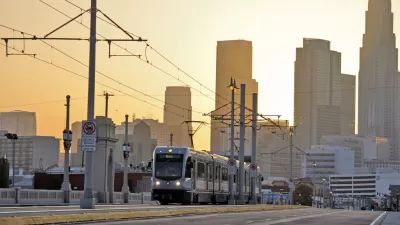Chicago shouldn't be surprised if drivers don't take to transit once its new pricing scheme is enacted. No matter the cost, most motorists won't make the switch until the city's transit system is more reliable, argues a recent column.
"With the help of a $153 million federal grant, the City of Chicago and the Chicago Transit Authority hope to get more drivers to leave their cars in the garage. The money will be used to test a plan to provide bus-only lanes during rush hour and to implement a congestion-pricing system on downtown parking. The idea is to make riding the bus more pleasant and driving a car pure hell.
The latter will be accomplished on Day One, when motorists are squeezed into fewer lanes to make room for the unleashed buses. When those drivers finally get downtown, they'll pay premium rates on parking meters, or higher taxes to park in lots and garages. A day or two of that and they'll abandon their cars and join all the happy campers cruising to work in the new bus lanes, right? Not likely.
CTA riders will tell you the buses and trains are anything but reliable. Buses arrive at the stop late-and full. Trains crawl through slow zones or park on the tracks for several minutes without explanation. Aged trains and buses are prone to breakdowns. Monday's 30-minute commute takes 55 minutes on Tuesday and longer than an hour on Friday."
"If Chicago wants to migrate drivers to mass transit, it should concentrate on making the buses and trains a better option, not making the car a worse one. Or as Alasdair Cain, senior research associate at the National Bus Rapid Transit Institute in Tampa, puts it: "Avoid implementing the stick before the carrot is there." "
FULL STORY: The $153 million traffic jam

Trump Administration Could Effectively End Housing Voucher Program
Federal officials are eyeing major cuts to the Section 8 program that helps millions of low-income households pay rent.

Planetizen Federal Action Tracker
A weekly monitor of how Trump’s orders and actions are impacting planners and planning in America.

The 120 Year Old Tiny Home Villages That Sheltered San Francisco’s Earthquake Refugees
More than a century ago, San Francisco mobilized to house thousands of residents displaced by the 1906 earthquake. Could their strategy offer a model for the present?

Austin Launches $2M Homelessness Prevention Fund
A new grant program from the city’s Homeless Strategy Office will fund rental assistance and supportive services.

Alabama School Forestry Initiative Brings Trees to Schoolyards
Trees can improve physical and mental health for students and commnity members.

NYC Outdoor Dining Could Get a Re-Do
The city council is considering making the al fresco dining program year-round to address cost concerns from small businesses.
Urban Design for Planners 1: Software Tools
This six-course series explores essential urban design concepts using open source software and equips planners with the tools they need to participate fully in the urban design process.
Planning for Universal Design
Learn the tools for implementing Universal Design in planning regulations.
Ada County Highway District
Clanton & Associates, Inc.
Jessamine County Fiscal Court
Institute for Housing and Urban Development Studies (IHS)
City of Grandview
Harvard GSD Executive Education
Toledo-Lucas County Plan Commissions
Salt Lake City
NYU Wagner Graduate School of Public Service





























